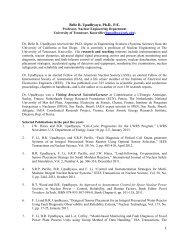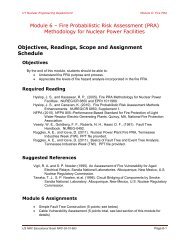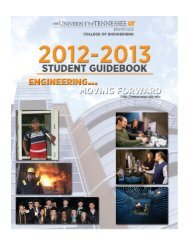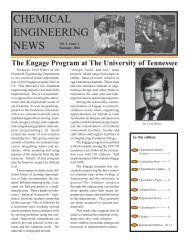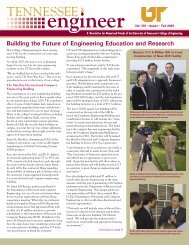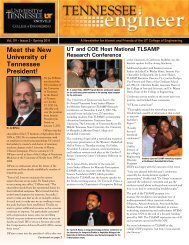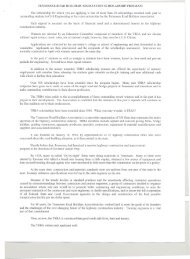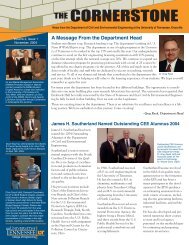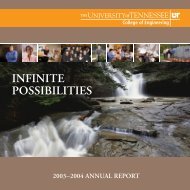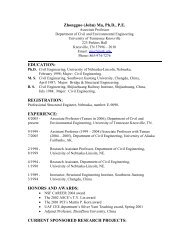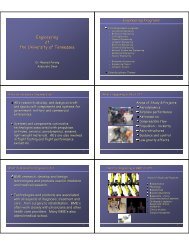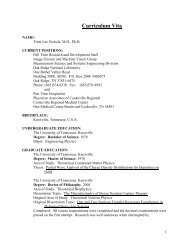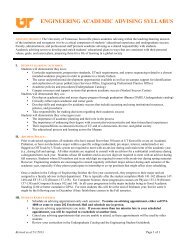Student Guidebook 2013 (PDF) - College of Engineering - The ...
Student Guidebook 2013 (PDF) - College of Engineering - The ...
Student Guidebook 2013 (PDF) - College of Engineering - The ...
Create successful ePaper yourself
Turn your PDF publications into a flip-book with our unique Google optimized e-Paper software.
Shared Responsibility<br />
– STUDENTS – To assist with the success<br />
<strong>of</strong> your academic advising sessions<br />
and your academic career, it is your<br />
responsibility to<br />
engage in an intense self-study. Explore options.<br />
Clarify values and goals. Relate interests and abilities to<br />
educational and career plans.<br />
schedule an advising appointment early each semester.<br />
review your curriculum in the Undergraduate Catalog.<br />
write down your current schedule and a tentative plan<br />
for next semester.<br />
meet course prerequisites and corequisites, and select<br />
specific courses.<br />
write down any questions you have for your advisor.<br />
keep copies <strong>of</strong> your relevant academic records.<br />
follow through on referrals and recommendations<br />
made during the advising session.<br />
register for the courses discussed during the advising<br />
appointment.<br />
consult with your advisor before making drastic<br />
changes to an agreed-upon schedule.<br />
consult with your advisor on issues related to academic<br />
progress, a change in program, registration for study<br />
abroad, internships and co-ops, courses to be taken<br />
at another institution, withdrawal from courses, or<br />
withdrawal from the university.<br />
apply to graduate online at My UTK, one year in<br />
advance <strong>of</strong> the term in which you plan to graduate.<br />
(Most students have completed 80 to 90 hours by this<br />
time.)<br />
make final decisions and take responsibility for your<br />
academic success.<br />
It is your advisor’s responsibility to<br />
be accessible to you during reasonable hours.<br />
provide a means through which you can schedule<br />
appointments.<br />
understand the curriculum, graduation requirements,<br />
and university policies.<br />
provide accurate information.<br />
discuss specific university, college, and departmental<br />
requirements, procedures, and deadlines.<br />
help you define and develop realistic goals and discuss<br />
the linkage between academic preparation and career<br />
opportunities.<br />
assist you in planning programs <strong>of</strong> study, both shortterm<br />
and long-term, that are consistent with your<br />
abilities and interests; such as course load, academic<br />
background, program demands, and employment or<br />
personal commitments.<br />
help you identify special needs and acquaint you with<br />
services and programs provided by the college and the<br />
university.<br />
refer you to other services, departments, and specific<br />
individuals as special needs are identified.<br />
monitor your progress toward educational goals<br />
and keep accurate, up-to-date records <strong>of</strong> academic<br />
progress.<br />
assist in the petitioning process for exception to policy.<br />
respect your right to privacy <strong>of</strong> educational records<br />
and discuss confidential information only with<br />
appropriate individuals and for the purpose <strong>of</strong> serving<br />
your best interests.<br />
help you assume responsibility for your decisions and<br />
actions.<br />
“I’m quite into the idea <strong>of</strong> engineering being beautiful.”<br />
-Sean Booth,<br />
British musician<br />
6



